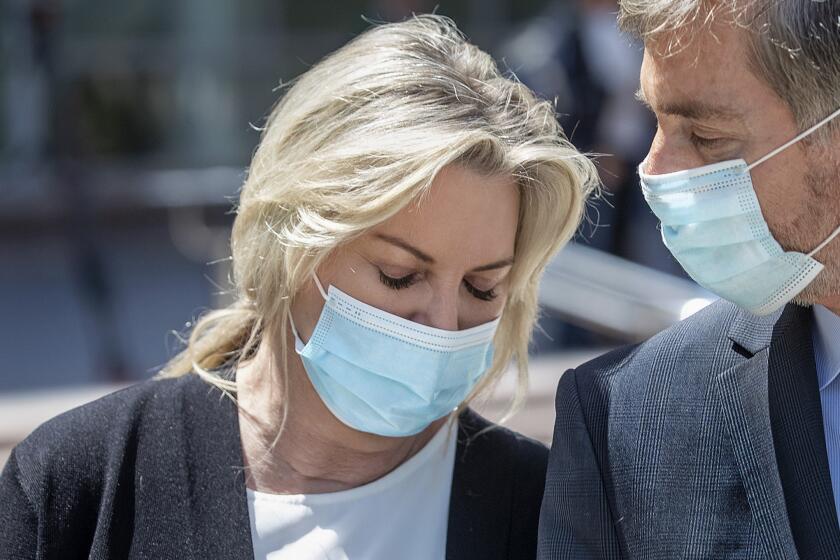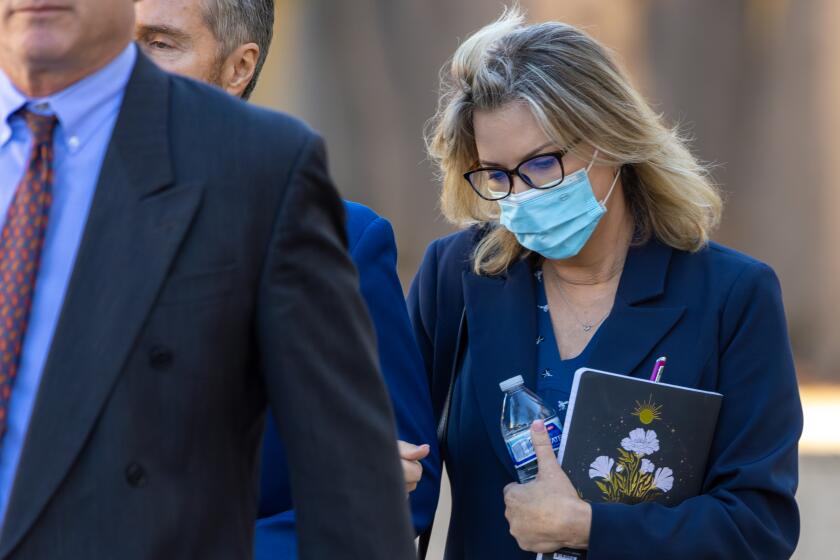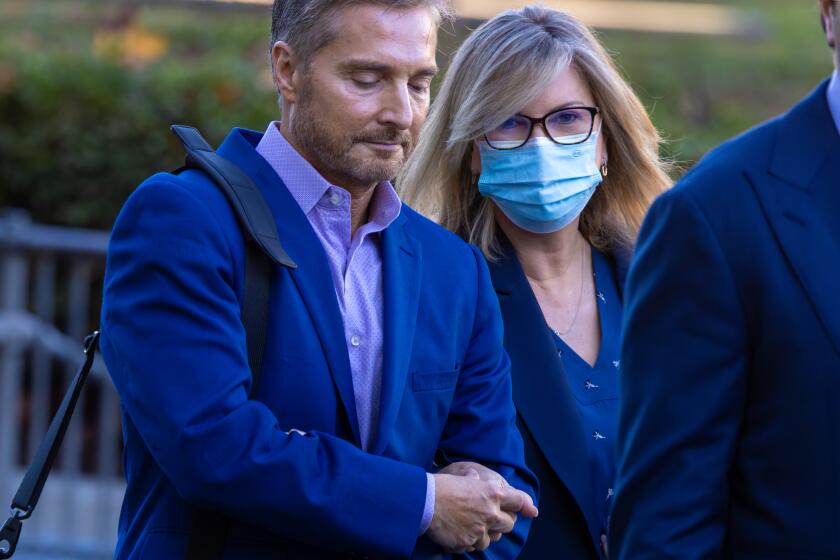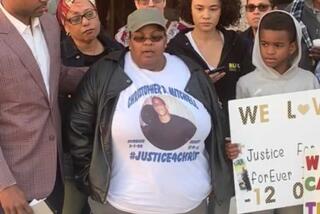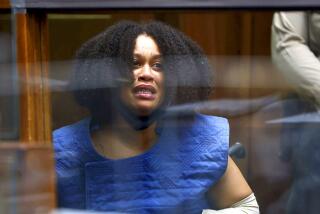Prosecution rests in Grossman hit-and-run murder case. Judge declines to dismiss charges
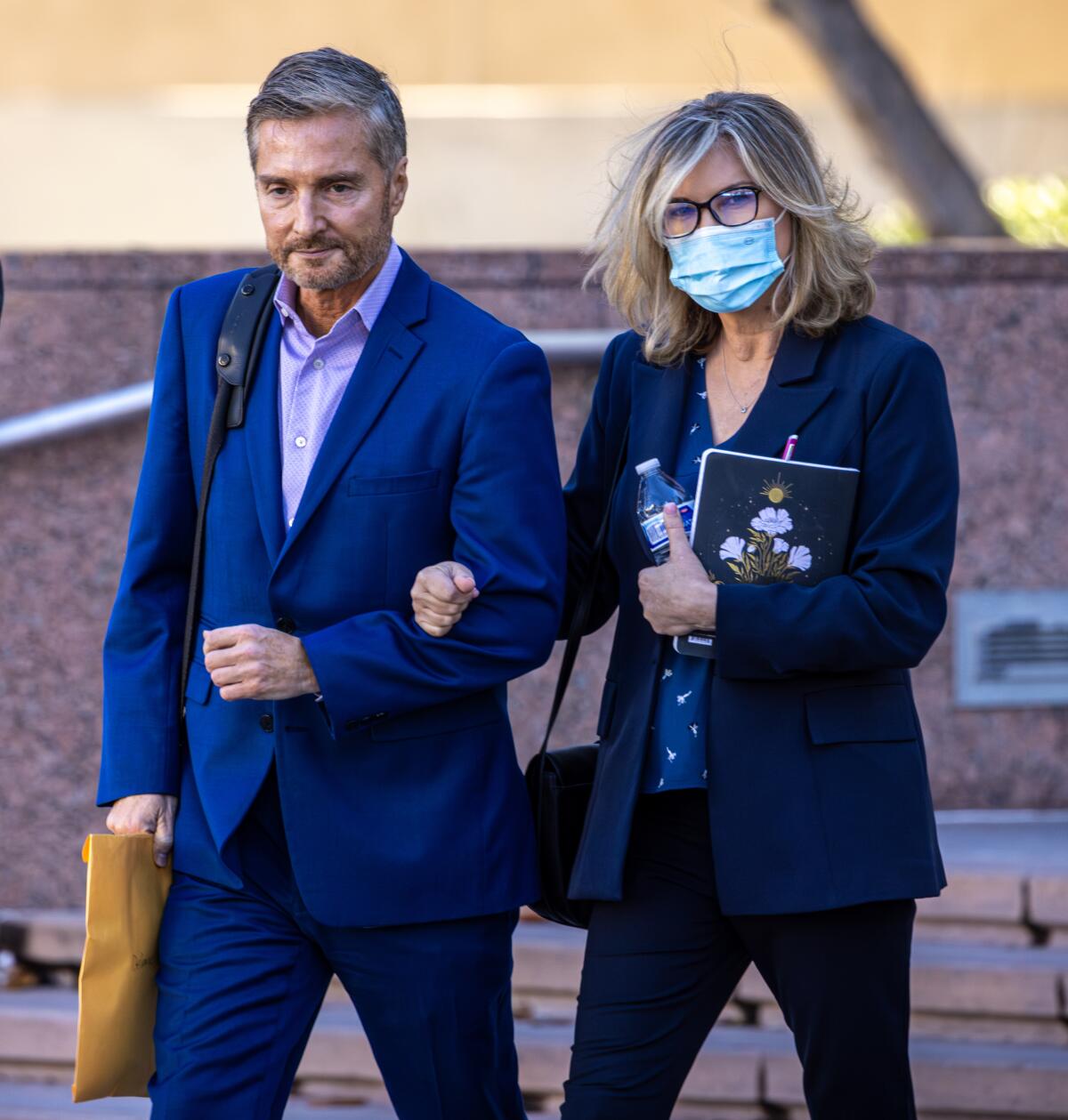
- Share via
A Los Angeles Superior Court judge denied a request by Rebecca Grossman’s legal team to dismiss murder charges against her in the 2020 hit-and-run deaths of two boys, as prosecutors rested their case Friday.
Judge Joseph Brandolino said prosecutors presented sufficient evidence of voluntary intoxication and speeding in the incident that resulted in the deaths of Mark Iskander, 11, and his brother Jacob, 8, in a marked crosswalk as they were following their mother and younger brother across Triunfo Canyon Road in Westlake Village.
“I do think they have met their burden, and the jury should decide. I am denying the motion without prejudice,” the judge said. Grossman’s lawyers are slated to begin their defense Tuesday.
After the last prosecution witness testified, John Hobson, one of Grossman’s attorneys, requested that the murder and hit-and-run charges be dismissed, arguing that the prosecutors had failed to show she acted with implied malice and that there was no evidence she fled the scene.
Grossman’s attorney argued that prosecutors had not met the standard for second-degree murder because the suspect did not get formal prior admonition that her behavior was extremely dangerous and showed a reckless disregard for life.
Hobson said the only proof given by prosecutors of her prior admonition was a text Grossman sent a month before the incident concerning teens crashing a vehicle and evidence that in 2013, she received a speeding ticket that came with a warning by an officer about the dangers of speeding.
Hobson also asked the judge to dismiss the hit-and-run allegation because Grossman stopped as soon as it was reasonable.
“The fact is, Mrs. Grossman was a short distance from her home,” but she stayed with her vehicle, he told the judge.
Rebecca Grossman floored her high-powered Mercedes SUV on a quiet residential street, speeding up to 81 mph and barely braking before fatally striking two boys in a Westlake Village crosswalk, a veteran crash investigator testified at the L.A. socialite’s murder trial Wednesday.
Deputy Dist. Atty. Ryan Gould, however, said the prosecution showed implied malice and that Grossman knew the deadly consequences of speed because of the 2013 ticket for going 92 mph on the 101 Freeway, when she was warned of the deadly nature of her actions.
As for the hit-and-run charges, Gould noted that Grossman was found by a deputy a third of a mile from the site of the crash.
“She never returned to the scene. She never provided assistance,” Gould said.
“We know from her text messages she saw a woman falling in the middle of the road,” he added in reference to a June 2022 text Grossman sent to a friend in which she said that at the time of the collision, she had been distracted by the boys’ mother, Nancy Iskander, who was wearing inline skates and had fallen in the crosswalk. The text, shown to jurors Wednesday, contradicted her account that she had no idea why her airbag had exploded.
Grossman, 60, is charged with two counts of second-degree murder, two counts of vehicular manslaughter with gross negligence and one count of hit-and-run driving resulting in death in connection with the collision. The murder counts are unusual, as she was not charged with driving under the influence, which is typically used to prove gross negligence in vehicular fatalities.
Prosecutors, however, have argued that Grossman was impaired. She had been drinking cocktails with Scott Erickson, a former pitcher for the Los Angeles Dodgers, before the erstwhile lovers raced back from a restaurant in separate vehicles, heading to Grossman’s lakeside home. A breathalyzer test at the scene showed that Grossman had a blood alcohol level of about 0.075%; a blood test three hours later came back at 0.08%, California’s legal limit. Valium was also found in her system, two criminalists have testified.
Prosecutors rested their case with a retired California Highway Patrol officer turned crash expert, John Grindey, who testified that Grossman was going so fast that her Mercedes safety system couldn’t detect the two boys in the crosswalk to automatically apply the brakes.
Grossman’s lead attorney has throughout the trial argued it was Erickson’s black SUV — not his client’s white Mercedes — that first struck the children.
Emphasizing the repeated prosecution theme of deadly speed, Grindey said Grossman’s Mercedes 43 GLE approached the Triunfo Canyon Road crosswalk at 81 mph.
“Over ... 44 mph, [the safety system] does not detect small children,” he told jurors.
But Grindey, who handled hundreds of deadly crashes as an officer, acknowledged that Los Angeles County Sheriff’s deputies who oversaw the crash scene made several mistakes, including taking incorrect measurements and letting car parts from Grossman’s vehicle be tossed away.
He also conceded under cross-examination by Tony Buzbee, Grossman’s attorney, that if he had known she was following Erickson’s Black AMG Mercedes through the crosswalk, he would have checked the former Dodgers pitcher’s vehicle. He said sheriff’s investigators did not do so at the time of the incident.
“I think it would have been important to do that,” Grindey agreed with Buzbee.
A text message written by Rebecca Grossman, on trial for the murder of two boys killed in a car crash, reveals how she briefly turned her head while driving, distracted by a woman wearing inline skates.
Buzbee has argued that Grossman’s vehicle was not the first to hit the brothers. He has repeatedly indicated that Erickson’s black Mercedes, which sped through the intersection before hers, struck both children, throwing Jacob to the curb and Mark high into the air before he landed in the path of her SUV.
However, Grindey testified that such a scenario was an “impossibility” because Erickson’s Mercedes had a hood that was too high to send Mark flying upward. He said the damage to Grossman’s car and the height of its hood indicated that it was she who propeled Mark forward by striking him with the portion of the vehicle above the license plate and hit Jacob with the passenger-side headlight, sending him toward the curb.
Grindey said the debris from the crash began 50 feet from the point of impact, a pattern seen when traveling at 73 mph.
Grindey said a photo of the crash scene showed a fog lamp, part of Grossman’s passenger light casing, and that Erikson’s vehicle had no such lights. He testified that a photo of a piece of license plate at the scene matched up to a part missing from Grossman’s plate holder. But he acknowledged that he had not seen those objects in person, because some evidence had been tossed away. Grindey said, however, that those errors did not change his opinion that Grossman hit the brothers.
Buzbee has told jurors he plans to show that the boys were following their mother across the crosswalk. During a court demonstration, Buzbee showed how Mark, who was riding a skateboard, would have turned his back to a vehicle that hit him. That would be consistent with the injuries to his back area, Buzbee said.
Buzbee, who will begin presenting the defense Tuesday, said after the proceedings that he “never actually expected a dismissal at the end of the state case, but we are well far ahead of where we should be at this point.”
“We haven’t presented a witness yet, but there is reasonable doubt all over this case,” he said.
More to Read
Sign up for Essential California
The most important California stories and recommendations in your inbox every morning.
You may occasionally receive promotional content from the Los Angeles Times.
